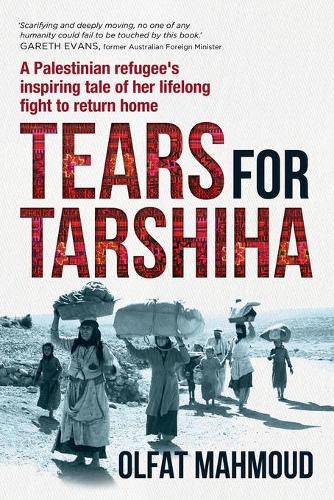
Tears for Tarshiha
(Paperback)
Publishing Details
Tears for Tarshiha
By (Author) Olfat Mahmoud
Contributions by Helen McCue
Contributions by Dani Cooper
Wild Dingo Press
Wild Dingo Press
1st August 2018
Australia
Classifications
Physical Properties
Paperback
282
Width 154mm, Height 254mm
Description
A Palestinian refugee's inspiring tale of her lifelong fight to return home. Olfat Mahmoud is a Palestinian refugee a descendant of the Christian and Muslim people who fled Palestine in the period leading up to and after the founding of the state of Israel in 1948. She is an accomplished woman in her own right: the director of an international NGO, an internationally recognised peace activist, a registered nurse and, most recently, the recipient of a doctorate.
Born in a refugee camp in Lebanon more than 60 years ago, Olfat's determination to help her people in their fight to return to their homeland led to a nursing career that has placed her at the front line of atrocious massacres and wars in the Middle East. Tears for Tarshiha follows Olfat's career amid the death and destruction of Lebanon's many conflicts, and chronicles the Palestinian people's remarkable capacity for love and bravery in the most extreme conditions.
Olfat's extraordinary story is emblematic of the Palestinian plight, illustrating their continued survival and determination that has become an inconvenience to the international community. These are the descendants of those Palestinians who were forced from their homeland at gunpoint by the Israeli military in 1948 in what is known as the Nakba or Catastrophe.
In 1949, David Ben-Gurion, one of the founders and the first prime minister of Israel, stated that 'we must do everything to ensure [the Palestinians] never do return...the old will die and the young will forget'. Despite Olfat's parents and grandparents never seeing Tarshiha again, this book is part of Olfat's ongoing campaign to keep her people's predicament in the public consciousness.
Reviews
"Olfat Mahmoud has long been a passionate, compassionate and articulate voice for Palestinian refugees. Her account of the agony of dispossession and exile - not least the horror of the murderous assaults on the Sabra Shatila and Borj el-Barajneh camps in Lebanon in the 1980s which she so bravely lived through - is both scarifying and deeply moving. No one of any humanity could fail to be touched by this book."
- Gareth Evans, former Australian Foreign Minister
"For too long, Palestinians have remained largely invisible in our media and demonised as terrorists. It's therefore wonderfully refreshing to read the history, reflections and passions of Olfat Mahmoud and understand what exile still means for millions of Palestinians around the world, refused access to their former homeland. I commend this book for its humanity and quest for justice. The Middle East will not see peace until these issues are resolved."
- Antony Loewenstein, independent journalist, film-maker, author of Disaster Capitalism: Making A Killing Out Of Catastrophe and My Israel Question
Author Bio
Olfat Mahmoud was born in a refugee camp in Lebanon. Olfat started her career as a nurse, then became a nurse educator, later joining the Faculty of Human Sciences at Beirut Arab University, earning a PhD in Psychology. She is currently an instructor at the university and the General Director of the Palestinian NGO 'Women's Humanitarian Organisation'. She also works tirelessly at both a local and international level as an activist for Palestinian and women's rights. Helen McCue is best known as a co-founder of Rural Australians for Refugees (2001). A trained nurse educator she worked with the World Health Organisation (WHO) in the Middle East in 1981, was then seconded to the United Nations Relief and Works Organisation (UNRWA) in Lebanon, and subsequently worked as a volunteer in refugee camps in Beirut 1982-83. In 1984 she co-founded the trade union aid body Australian People for Health Education and Development Abroad (APHEDA), and was its first Executive Director and regional adviser in South Africa and the Middle East until early 1994. She founded the Women Refugee Education Network (1996) and the Wingecarribee Community Foundation (2001), and was involved in the establishment of Wingecarribee Reconciliation Group (1997). Dani Cooper has worked as a senior journalist on national newspapers in the UK, Ireland and Australia, including as Foreign News Editor at The Australian. For the past decade she has worked as a freelance science journalist, editor and writer. She has previously written Livelihoods and Liberation Struggles - the history of the ACTU's aid agency, APHEDA-Union Aid Abroad.
